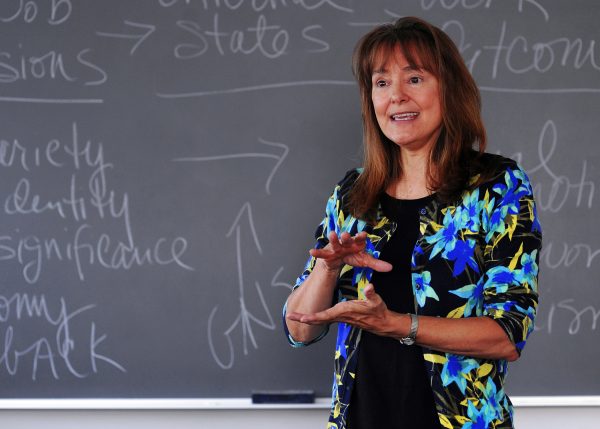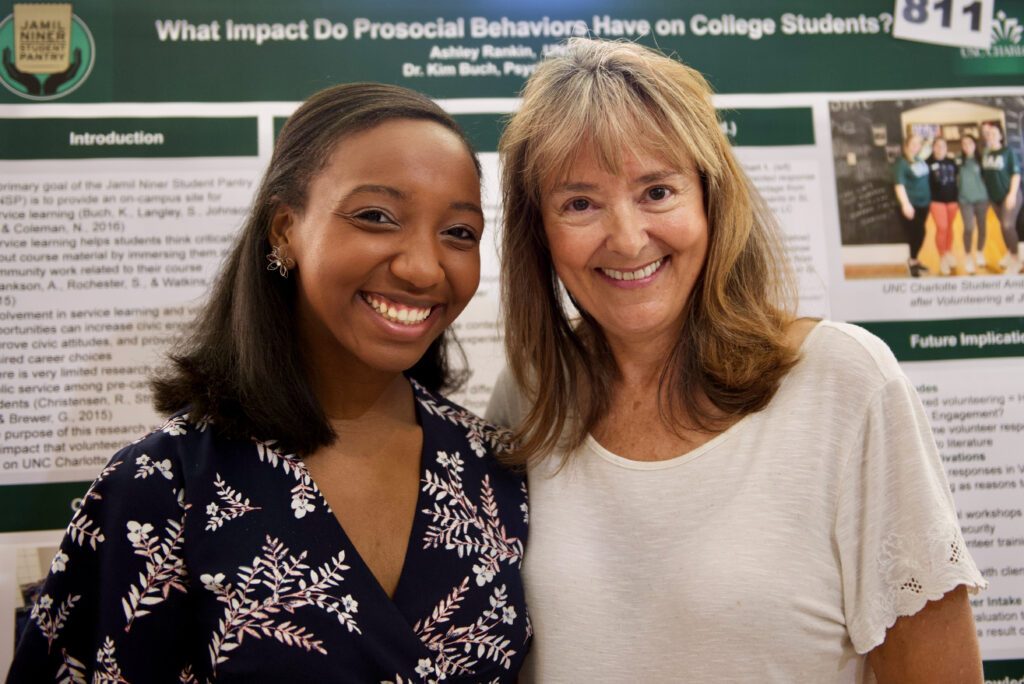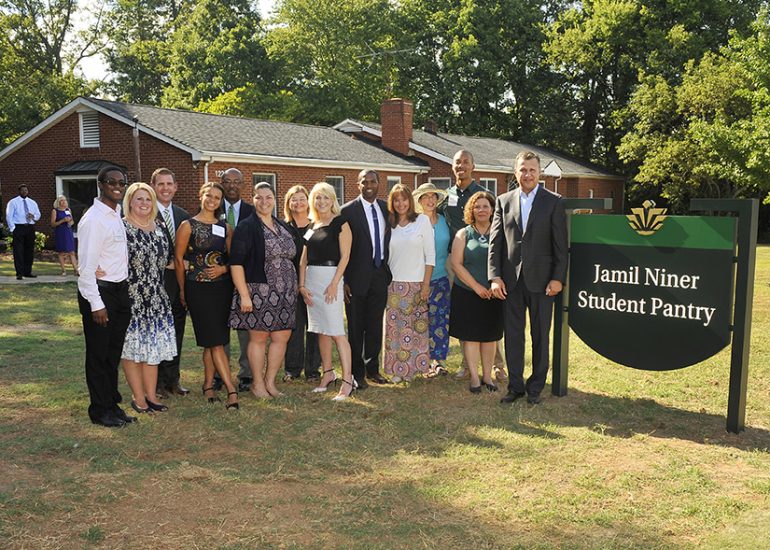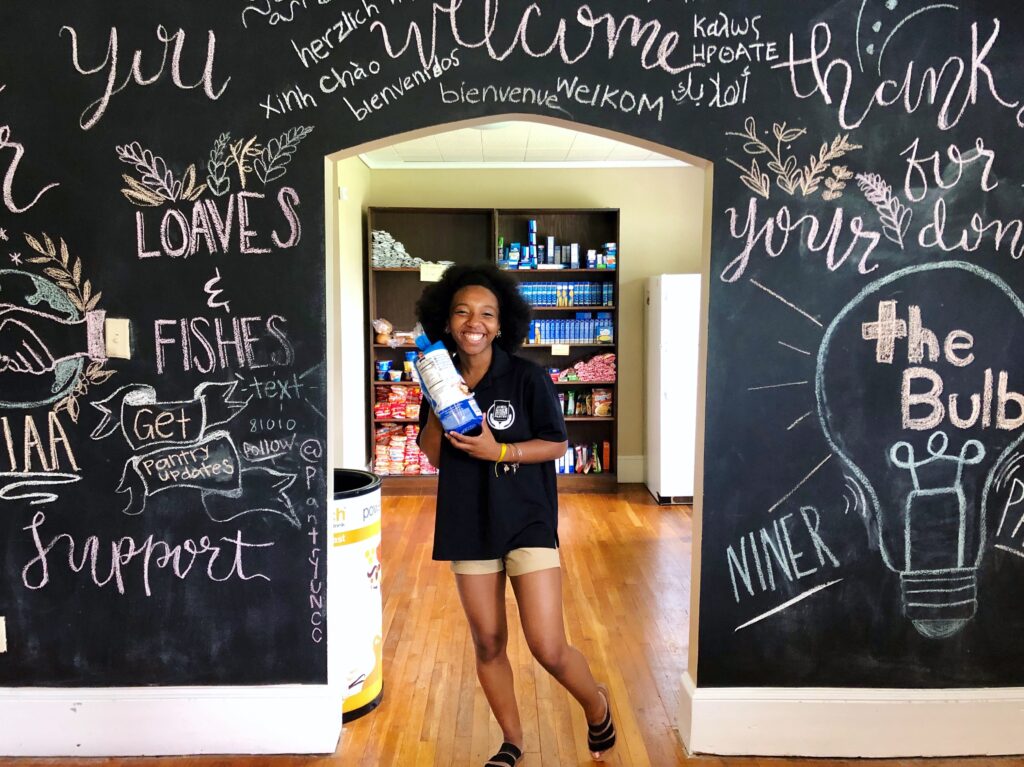Psychological Science Professor Receives National Campus Compact Award For Engaged Scholarship

Professor Kimberly Buch has been a leader in the transformation of UNC Charlotte’s culture of service over the past two decades, while directly inspiring 500 UNC Charlotte students to devote 25,000 hours to hands-on service learning.
In recognition of her work, Buch has received Campus Compact’s Thomas Ehrlich Civically Engaged Faculty Award, a national honor that celebrates faculty’s exemplary engaged scholarship accomplished through their teaching and research. Buch is the first at UNC Charlotte to receive the award.
“Dr. Buch has helped students learn how to make a difference in their communities, has expanded our understanding of effective methods for teaching and learning through engaged scholarship, and has been a model for those who seek to improve their community’s quality of life,” said Chancellor Sharon L. Gaber, who nominated Buch for the recognition.
The award, presented in partnership with Brown University’s Swearer Center, considers nominees’ collaboration with communities, institutional impact, and high-quality academic work.
Students Are The Heart
For Buch, it’s all about the students. “Our efforts are to teach students how to serve by serving,” she said. “That’s the heart of this story. I am so proud of our students. This award really isn’t about me. I represent a lot of other people that are doing this work and who did this work before me, and the next generation of faculty and students who are coming along.”
Among the students who have worked alongside Buch is Ashley Rankin ’19, who completed a bachelor’s degree in psychology and minors in communication studies and in urban youth and communities. Her experiences with service learning at UNC Charlotte were life-changing.
“The word humanity keeps coming to mind,” Rankin said. “When you have the opportunity to learn in a real-world setting, and it’s not defined by a textbook or the most ideal situation, but is what is really happening, you learn more about how important the valuing of humanity is and what it means to serve someone. You also receive something in return as a result of serving someone else. That is one of the most powerful things I learned by participating in service learning in the academic realm. I learned to be selfless.”
Rankin has carried the spirit of engaged service with her to Appalachian State University, where she is a graduate studies assistant with the University’s student pantry. She expects to complete a master’s degree in industrial-organizational psychology and human resource management in May and join Johnson & Johnson in its two-year human resources leadership development rotation program.

While at UNC Charlotte, Rankin was part of an undergraduate research group that studied the impact that professional clothing events held at the Jamil Niner Student Pantry had on UNC Charlotte students. Through the University Career Center, students gained professional development and personal branding tools. In her role as a University Professional Internship Program (UPIP) intern at the Pantry, Rankin initiated a clothing closet effort called Attire for Hire.
“I am very passionate about creating inclusive spaces in the workplace,” Rankin said. “My experiences at UNC Charlotte with service learning and in the student pantry directly aligned with my passions and opening my perspective to more than just my own. When you’re talking about organizations, and making policy, and ensuring everybody’s voices are heard, there are systemic things that prevent or are barriers to certain people having their voices heard in a way that translates into policies and protections and norms within an organization.”
Collaborating with Buch as a servant leader at UNC Charlotte led to her graduate assistantship, then to a diversity, equity and inclusion internship, and to her new opportunity with a global company.
Service Learning Sparks Student Success
Rankin’s experience illustrates the impact of service learning, Buch said. “Service learning,” she said, “is recognized through decades of research as one of the most highly effective and powerful ways of teaching and learning in higher education. The research has consistently shown that service learning impacts student success throughout their academic careers.”
Students’ experiences transcend simply learning about their majors or disciplines.
“And yet,” Buch said, “you are applying all of the knowledge from your discipline in doing the work that you’re doing. It asks students to use what they’re learning in their discipline, apply that knowledge to a service site in a way that makes a meaningful contribution to the community. At the same time, it’s teaching them to be change agents, how to understand the importance of being an engaged citizen and that being an engaged citizen starts really close to home, on your campus and in your community.”




In 2003, Buch created the Psychology Learning Community for first-year majors. She centered the program on community service and integrated service learning throughout the curriculum. Learning community students have actively engaged with 30 Charlotte organizations and nonprofits.
Seeking to establish an on-campus service site, Buch co-founded the Jamil Niner Student Pantry in 2014. The pantry has since provided thousands of students with food assistance while providing thousands more the opportunity to learn how to serve.
Collaboration Is Key
Buch currently coordinates a new learning community for transfer psychology majors. She also created a Psychology Service Learning Study Abroad program in Cuenca, Ecuador. She assisted Professor Susan Harden in the creation of the Civic Minor in Urban Youth and Communities and the Charlotte Community Scholars summer research program for undergraduates – all designed to provide more opportunities for community engagement. She is a faculty fellow in the Center for Teaching & Learning and coordinates the Center’s professional development and support initiatives for adjunct faculty. She also has written extensively on high-impact educational practices including learning communities and service learning.
Reflecting on the growth of community engagement activities on campus, Buch noted the tremendous increase in the numbers of faculty and students involved, as well as the creation of institutional structures that support and promote engagement. UrbanCORE serves as the hub of UNC Charlotte’s engaged scholarship ecosystem, connecting the University’s interdisciplinary, urban research resources to community assets.
Additionally, those involved in service learning on campus, including Buch, have long turned to Campus Compact for support.
“This award is especially meaningful because Campus Compact has been such a resource to me throughout my professional career,” Buch said. “I don’t know of a more impactful organization for supporting and advancing service learning and engaged scholarship in higher education than Campus Compact. It is such an honor to be recognized by them for my work.”
Buch, a professor in the Department of Psychological Science, joined the faculty at UNC Charlotte in 1987. She has published over 50 publications, many with students as co-authors; made over 100 professional presentations; and had her research featured in The Wall Street Journal, The Chronicle of Higher Education, and leading textbooks and journals. She has secured as principal investigator or co-PI $3M in external funding and as senior personnel over $8M in funding. Previous awards include the UNC Board of Governor’s Award for Teaching Excellence, the Bank of America Excellence in Teaching Award, and the Bonnie E. Cone Professorship in Civic Engagement.
Words: Lynn Roberson